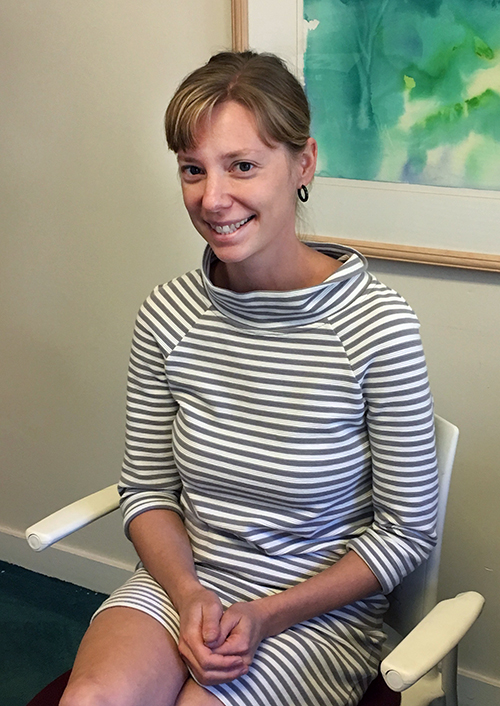The Lincoln Council on Aging has hired a new co-assistant director with the tools to help meet the needs of the town’s growing senior population.
Abby Butt started at the COA in September, sharing her job with Susan Isbell (she succeeds social worker Pam Mizrahi, who still leads a support group at the COA). Isbell helps seniors with applications for programs and services such as fuel assistance, while Butt handles more complicated situations where the client’s need aren’t so cut and dried.
Butt is not a social worker or counselor—she holds a PhD in gerontology from UMass-Boston’s McCormick School of Public Policy, and she’s trained in researching programs and doing needs assessments for entire communities as well as individuals. While a graduate student, she held a fellowship through the city of Somerville’s housing division, and she was outreach coordinator for the Beverly COA from 2011-16. She’s also a board member of the COA in Salem, where she currently lives.
“I discovered I really love working for cities and towns — I love working locally, kind of at the ground level,” said Butt, 34. “I enjoy doing a little of this and a little of that, and getting to know people. I’m excited about getting out into the community.” She has begun holding office hours at Lincoln Woods and making home visits, “so we can give services right where (clients) are,” she said.
Another part of Butt’s portfolio is modernizing the COA’s record-keeping. Before her arrival, all case notes were kept on paper; having them in digital form will make it easier for COA staff to follow up with clients with resorting to phone calls or lengthy emails with each other, “so the seniors are going to get much better service,” she said. The COA plans to move from hand-written to electronic sign-in for activities at Bemis Hall, “so the receptionist can focus on being welcoming and helping people instead of trying to get them to write legibly on a piece of paper about the activities they’re participating in,” Butt said.
The ability to gather growing amounts of information from individuals and government — then “distilling it down into something that’s manageable into a policy brief and recommendations and action steps,” as Butt describes it — is becoming more important every day. “We’re about to have more seniors than we ever have, and we need to be proactive.”
Research by Butt’s colleagues, among others, bears this out. The Baby Boomers have begun to retire, and improved medical technology means people are living longer — and requiring more services — as they move into their 80s, 90s and beyond.
In Massachusetts, the share of the population age 60 and older is expected to increase from 19 percent in 2010 to 28 percent in 2030, with 65+ population growing by 61% and the 85+ population by 34 percent, according to UMass-Boston’s Center for Social and Demographic Research on Aging. As a result, most cities and towns in the Commonwealth will have at least 50% more seniors in 2030 than they do today—so Lincoln is hardly alone in confronting the need for better facilities and programs for its older residents.
“Abby has already made a wonderful difference here at the COA by bringing not only her enthusiasm and skills, but also lots of ideas from the other COAs she’s worked with,” said COA director Carolyn Bottum. “She’s helped us take a fresh look at how we do things and some of our procedures, and she’s also suggested a number of important and entertaining programs that we’ll be offering here in the next few months.”
The town of Salem, where Butt sits on the COA board of directors, has just broken ground for a new community center. That experience should also prove very useful “to help us ensure that we are bringing the best possible proposal to the town for a community center at the appropriate time,” Bottum said.

Leave a Reply